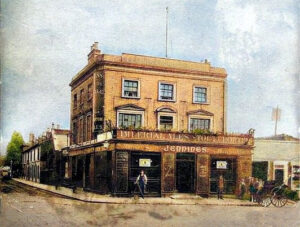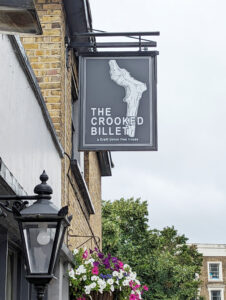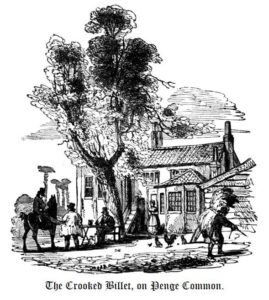A field behind the Crooked Billet pub was where the first Crystal Palace FC played their home games for two seasons.
The team began life at Crystal Palace Park but when when that became unavailable, they moved down the road to Penge and were here from 1864 to 1866.
Palace recorded their only victory at the venue on their sloping pitch – a 2-1 win over Clapham on October 28, 1865. Captain James Turner provided the winning goal.
England’s second captain and second oldest player, Alex Morten, played on the ground and probably enjoyed an ale or two in the pub afterwards.
FA administrator Charles Alcock, who devised the FA Cup and international football, came here as an opposition player.
Some of the Palace players, like George Fleet, lived within walking distance in Penge.
 A widower Mrs Maria Matthew was the landlady of the Crooked Billet during the mid 1860s and she ran the pub for more than a decade.
A widower Mrs Maria Matthew was the landlady of the Crooked Billet during the mid 1860s and she ran the pub for more than a decade.
The teams more than likely got changed there and she may have served them a luncheon.
While dissecting the game or issues of the day at the bar, the players would probably still be caked in mud as the playing surface was often in a poor condition.
When Palace hosted Barnes in a 15-a-side game in February 1865, the Sporting Life said the ground was in a dreadful state, being almost underwater.
The team had no ground for 1866/67 but managed to negotiate a return to Crystal Palace Park a year later.
The construction of housing on the smallholding is the likely reason why the team could no longer play on the site as a later map of the area shows the grid of new roads.
 The historic Crooked Billet, which was built in 1827, rebuilt in 1840 then extended in 1925, has a history which goes back to 1600.
The historic Crooked Billet, which was built in 1827, rebuilt in 1840 then extended in 1925, has a history which goes back to 1600.
The word Penge comes from the Celtic word ‘penceat’ which means ‘edge of wood’. It appears that there were some Celts living here for many years.
Penge was a luscious common with medieval woodland and people stopped here as a horse-changing hostelry on the good road to Kent.
Legend has it that as the hamlet was so heavily wooded, a sign had to be placed on the main road to guide the traveller to the overnight shelter. This sign was a bent or knotted branch and the ‘crooked billet’ led to the pub’s name.
 William Hone was an English writer, satirist and bookseller. He wrote about a visit to the pub in 1827. He and a friend ate eggs, bacon and spinach from the pub garden.
William Hone was an English writer, satirist and bookseller. He wrote about a visit to the pub in 1827. He and a friend ate eggs, bacon and spinach from the pub garden.
Sat in a comfortable parlour, with a bow-window view of Penge Common. He said the house affords as good accommodation for man and horse as can be found in any retired spot so near London. His friend sketched this illustration below.
After the 1840 rebuild, the Crooked Billet was badly damaged during the Second World War and was constructed one story lower. The original hall to the rear remains intact.
Douglas Allport’s house
Douglas Allport was the long-serving secretary and captain of the first Crystal Palace FC.
In 1871, Allport lived a stone’s throw away from the Crooked Billet at 19 Queen Adelaide Road. He resided here with his wife, four children and three servants and worked as a West India merchant.
After the FA Cup competition was mooted, Allport was one of three Football Association committee men who sourced the first-ever FA Cup.
 Allport skippered Palace on their way to the 1872 FA Cup semi-final in its inaugural season, playing in each of the five ties.
Allport skippered Palace on their way to the 1872 FA Cup semi-final in its inaugural season, playing in each of the five ties.
Penge suffered greatly from enemy bombing during the Second World War and Queen Adelaide Road was devastated during The Blitz. Houses here were either destroyed or badly damaged.
After the war, people needed to be rehoused so three blocks of flats was the best solution. In 1950, families moved into the spacious new Queen Adelaide Court. The house where Allport once lived is now the green space outside the flats today.
